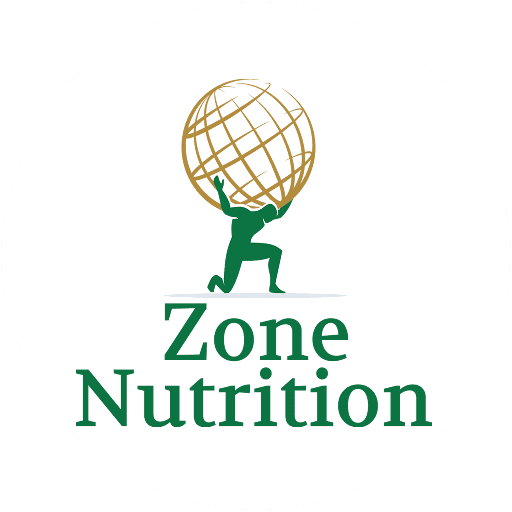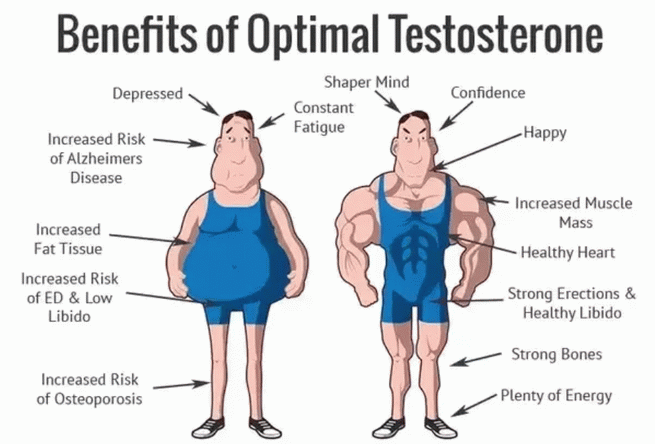Higher Testosterone levels for more Muscle growth & Fat Loss
Last Updated on June 3, 2023
Higher testosterone levels are often equated with more muscle growth and fat loss.
Here are basic Lifestyle Hacks For High Testosterone:
1- Sleep enough — often more is better
The majority of the daily testosterone release in men occurs during sleep. Fragmented sleep and obstructive sleep apnea are associated with reduced testosterone levels. A study released on The Journal of the American Medical Association, found out that one week of sleep restriction (5 hours of sleep per night) decreased testosterone production by 10–15%.
You’ll have more testosterone when you sleep 8 hours or more. Studies have also found out that sleep’s effect on testosterone has an inverted U-shaped curve. Testosterone production increased with increasing sleep duration up to 10 hours after which it decreased.
2- Get rid of extra belly fat and be lean
The fatter you are = The less testosterone you’ll have because your body fat contains an enzyme called aromatase that turns your manly testosterone into womanly estrogen making your testosterone levels drop.
The less fat you have = the more testosterone you’ll have because you won’t have as much aromatase going around turning your testosterone into estrogen.
But you don’t need to be an emaciated marathoner. Instead, it has been roughly estimated that a male body fat percentage between 8–14% is optimal for testosterone production. Higher fat mass also usually increased aromatase enzyme activity, which converts more testosterone into estrogen. In opposition, too low body fat content can be detrimental for testosterone production.
3- Practice strength training and gain some muscle mass
While practicing strength training and gaining muscle often reduces body fat percentage (which leads into higher testosterone), it also has independent effect on elevating testosterone. Having higher muscle mass is positively correlated with higher testosterone. Lifting medium-heavy weights explosively can stimulate short-term and long-term testosterone production. Training progressively by adding more weight nearly every time you train causes your body to adapt to higher and higher testosterone levels via neuromuscular adaptations.
4- Control your stress levels and meditate
Chronic stress leads eventually into chronically elevated stress hormone (cortisol) levels in the blood. Cortisol is necessary for life, but when excreted too much for too long, it can cause some serious health problems. One of the disadvantages is diminished testosterone secretion, as cortisol and testosterone compete of the same hormonal precursors and raw materials (mainly pregnenolone). For example in military conditions prolonged stress has been shown to significantly lower testosterone secretion.
Cortisol also makes you gain belly fat and the fatter you are = you’ll have more estrogen and less testosterone.
More sleep, exercise, improving your posture, supplementing with Ashwagandha, Vitamin C & Rhodiola Rosea are all things you can do to lower stress.
5- Eat nutrient dense whole foods and get enough (but not too many) calories
Let’s start with Micronutrients.
Getting enough and optimal amount of micronutrients is crucial for testosterone production. Measuring your micronutrient status is a crucial step on finding out what your exact situation is. The most important micronutrients for testosterone production are zinc, magnesium, calcium, vitamin D, B vitamins, iodine, selenium, vitamin K2, vitamin A, vitamin E, manganese and boron.
Eating a diet rich in nutrients and minerals (read: whole foods) is crucial not just for overall health, but also for optimal T production. Getting a high micronutrient multivitamin supplement on the basis of your personal needs can also be a testosterone saving thing if your diet is lacking something.
Next comes calories.
Your body needs enough calories to produce adequate amounts of testosterone. With constant and prolonged calorie restriction the body begins to adapt into survival mode, which means that for example reproductive system is not of great importance anymore. The body will conserve energy for vital processes and internal organs.
For optimal testosterone production it is wise to eat at maintenance or a slight calorie surplus. But if you are overweight, a minor calorie deficit and losing weight will actually elevate testosterone production (as explained previously). So, the plan is to get lean first and then eat higher calories for optimal testosterone production and maintenance. Losing weight slowly is a good option here: about 15% calorie deficit doesn’t seem to affect testosterone negatively. But it can affect somewhat negatively your thyroid hormone production.
Finally comes Macronutrients, AKA “macros”.
And when it comes to macros, nearly everybody, especially in the fitness industry, talks about protein. There are tons of different protein supplements that are supposed to make you lean and fit. Protein has gained a reputation that it is the most important macronutrient when it comes to building muscle and gaining strength. It is certainly true that protein and especially certain amino acids are essential for life and muscle tissues and that chronic protein malnutrition will cause low testosterone levels.
The caveat here is that you don’t actually need as much protein as you have been told. For most, the recommended daily allowance levels (1.0–1.4 g /kg of bodyweight) are enough for optimal testosterone production. For strength training individuals often recommended protein intake is 1.6–1.8 g / kg of bodyweight. Even athletes that practice strength training do not benefit from extra protein intake (over 2.0 g / kg of bodyweight).
Protein source is also a major factor in testosterone production. A study published in British Journal of Nutrition found out that for example when meat was replaced with soybean protein in healthy men, the testosterone:estradiol ratio decreased significantly. Yes, steak beats edamame, hands down.
For optimal testosterone production it also seems crucial that you don’t eat too much protein and that you eat enough carbohydrates and fat. One study which compared protein and carbohydrate changes and their hormonal effects found out that when the male subjects went 10-days on a high-protein low-carb diet, their total testosterone levels were 21% lower than what they would have been on a high-carbohydrate low-protein diet. The high-protein diet also caused significantly higher cortisol levels. The diets were equal in total calories and fat.
Another study, which compared ratios of protein to carbohydrates to different fats, found out that diets higher in carbohydrates and saturated+monounsaturated fats than protein were related to higher testosterone production in strength training men. Previous studies have also found out that men who consume a diet containing 20% of fat compared with diets containing 40% fat have significantly lower concentrations of testosterone in the blood. Many other studies also show that getting enough fat from diet is crucial for testosterone production. Also, getting enough cholesterol (raw material for steroid hormone production) from your diet is critical to optimal hormonal balance.
For men who exercise and especially those who perform an intensive training micro-cycle, it is crucial to eat enough carbohydrates (CHO) to optimize testosterone production. In one study two groups (30% of CHO vs 60% of CHO) were compared in terms of testosterone-to-cortisol-ratio. The study found out that those who ate 60% of carbohydrates had significantly higher free testosterone to cortisol -ratio than the lower carbohydrate group.
The bottom line is this: for optimal testosterone production you shouldn’t go too low in calories (neither too high), shouldn’t consume too much protein (under 2g/kg) or eat too little carbs and too little saturated and mono-unsaturated fats.
For me personally, the optimal ratio for T production seems to be on a 2500 kcal/day slight deficit diet with 98 kg bodyweight looks like this:
- 1.8g protein/ bodyweight (1.8g x 98 = 176.4 grams = 720 kcal)
- 40% of total calorie intake fat (1000 kcal = 111 grams)
- Rest of the daily energy need from carbohydrates ( 780 kcal = 195 grams)
That means also eating quite a bunch of carbohydrates, and yet at under 200g carbs this example would still be among conventional nutrition advisors called a “low carbohydrate diet”.
6- Drink enough water and hydrate yourself
Getting enough clean, mineral-rich water is not only crucial for life, but also for optimal hormonal balance. For example even mild dehydration (1–2%) can raise cortisol levels and deleteriously effect testosterone production. Especially when sweating a lot and during periods of heavy exercise, the importance of drinking water for testosterone maintenance is increased. The higher the level of the dehydration, the bigger the effects are on raising cortisol (and adrenaline) and lowering testosterone.
On the other hand, drinking too much water will also cause problems, such as diluting the blood and messing up with sodium balance in the body – even leading to hyponatremia (more precisely hypervolemic hyponatremia, or water intoxication) which, when severe, can cause numerous neurological and cardiovascular symptoms. So if you drink a lot of water, I recommend you add sea salt to prevent water retention and electrolyte disturbances.
7- Have regular sex
There hasn’t been any extremely convincing studies on sex frequency and testosterone correlation in young men. However, one big observational study conducted with 1226 older men (aged 70+) found that regular sex helped to diminish the decline in testosterone level that occurs naturally with age. The study says:
”We found a consistent association among older men followed over 2 years between the decline in sexual activity and desire, but not in erectile function, with a decrease in serum T. Although these observational findings cannot determine causality, the small magnitude of the decrease in serum T raises the hypothesis that reduced sexual function may reduce serum T rather than the reverse.”
8- Avoid exposure to endocrine disruptors in plastics, food & water
Endocrine disruptors are synthetic chemicals or natural substances that can alter the endocrine system. Ben talked about plenty of these in his latest “How To Detox Your Home” article.
Many of the endocrine disruptors are either directly negatively affecting testosterone production or acting as estrogen mimics (like xenoestrogens). These are mainly found in plastics, metal food cans, detergents, flame retardants, toys, pesticides, preservatives, cosmetics and pharmaceuticals. They have also been linked to many other health problems like cancer, decreased fertility, metabolic syndrome, hypothyroid and diabetes.
The number one way to reduce your exposure to these endocrine disruptors is to avoid the use of plastics as well as you can with the following strategies:
- Switch plastic cups to glass or steel cups & bottles (glass would be optimal)
- Store leftover food in glass jars
- Aquire a good tap filter that filters all contaminants and endocrine disrupters (e.g. reverse osmosis & activated charcoal filters)
- Use only organic & natural ingredient cosmetics
- Avoid junk food and prefer organic food
- Minimize the handling time with receipts or use gloves
- Avoid the use of detergents and flame retardants (and other possible endocrine disrupting chemicals)
9- Raise your basic aerobic physical activity (but don’t do too much endurance training)
Being physically inactive is quite deleterious to your testosterone production. It has been shown in various studies that sedentary men who engage in regular physical activity instantly raise their testosterone levels and do it quite significantly.
For example a 12-week period of increased physical activity in a group of obese men showed significant increase in testosterone levels independent of accompanied weight loss induced by a mild calorie deficit. This means that a basic low-level physical activity like walking is an independent testosterone boosting factor! On the flipside, too much endurance training has been shown to lower testosterone levels significantly. One interesting fact is that in endurance athletes, low T is an independent factor (possibly impairing testicular function) which is not even related to chronically elevated cortisol levels.
10- Sunlight
Spend more time in the sun. Your testosterone levels are 20% higher in the summer or during the months you’re most exposed to the sun.
Reference:
https://bengreenfieldfitness.com/article/biohacking-articles/how-to-biohack-your-testosterone/
http://www.nowloss.com/ways-to-increase-testosterone-levels-naturally-without-using-steroids.htm







Leave a Reply